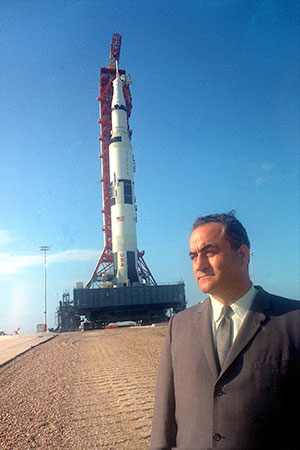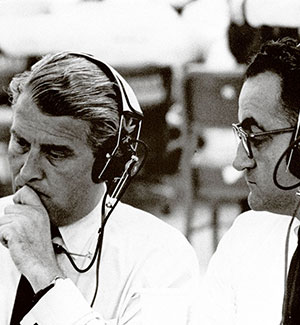 advertisements advertisements
|

|
Rocco Petrone, Apollo launch director, dies at 80
August 30, 2006 – Rocco Petrone, who served as NASA associate administrator, Marshall Space Flight Center director and Apollo program manager, died on Thursday (Aug. 24) at his home in Palos Verdes Estates, California. He was 80.
Petrone personally directed the first five manned Apollo launches, culminating in the Apollo 11 first lunar landing. In 1969, he was chosen by NASA to lead Apollo, giving Petrone overall responsibility for the management of the moon flights.
Shortly before the first moon landing, the Washington Post described Petrone as "a broad-shouldered tree of a man who in his line of work is treated with the same mixture of awe and respect football players give Vince Lombardi."
In 1972, he was assigned additional responsibilities as program director of the NASA portion of the U.S. and the former Soviet Union joint Apollo Soyuz Test Program.
Petrone was then named director of the Marshall Center in 1973. During his tenure, he presided over the center's role in Skylab, America's first space station. Petrone also oversaw a major restructuring to accommodate Marshall's changing roles and responsibilities in the 1970s.
In 1974, Petrone left Marshall to accept an appointment as Associate Administrator at NASA Headquarters in Washington, DC. There, he directed the Manned Space Flight and Space Science program offices, among others.
Born in Amsterdam, New York, in March 1926, Petrone graduated from the U.S. Military Academy in 1946. He served in the U.S. Army in Germany from 1947 to 1950. Upon his return to the States, he resumed his studies at the Massachusetts Institute of Technology in Cambridge, receiving his master's degree in mechanical engineering in 1951. In 1952, he was awarded a professional degree in mechanical engineering.
Petrone's career in rocket development began in the early 1950s, when he participated in the development of the Redstone rocket, the nation's first ballistic missile. He was in the blockhouse in Cape Canaveral, Florida, as a member of the Missile Firing Laboratory when the first Redstone was launched in 1953. He was then detailed to the Army General Staff at the Pentagon in Washington, DC, where his assigned duties were in the field of guided missiles.
While still on active duty with the Army as a lieutenant colonel, Petrone transferred to NASA's Kennedy Space Center in 1960 to serve as Saturn Project Officer.
Petrone was responsible for the planning, development and activation of all launch facilities required for the Apollo Program, including Launch Complex 39 where the Apollo-Saturn V rockets were launched, the Vertical Assembly Building, the launch towers, the tractor crawler transporters and the mobile service structure. He was directly involved in all successful launches of the Saturn I and Saturn IB vehicles.
Following his retirement from the Army in 1966, Petrone became director of Launch Operations at Kennedy. Under that title, Petrone was responsible for the management and direction of pre-flight operations and integration, test, checkout, and launch of all space vehicles, both manned and unmanned.
In 1975, Petrone retired from NASA and became the president and chief executive officer of the National Center for Resource Recovery, a joint industry/labor effort to develop and encourage ways to recover materials and energy from solid waste. During the 1980s, he held senior posts at Rockwell International.
The recipient of numerous awards and honors, Petrone is survived by his wife of 50 years and four children. |
|

Portrait of Apollo program manager Rocco Petrone standing in front of a Saturn V rocket atop a crawler-transporter. (NASA)

Rocco Petrone, right, seated next to Dr. Wernher von Braun in the Launch Complex 37 control center in Florida in 1964. (NASA) |
|

© 1999-2025 collectSPACE. All rights reserved.
|
|

|

|
